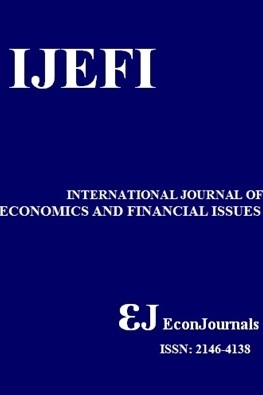Issues and Challenges of Saudi Female Labor Force and the Role of Vision 2030: A Working Paper
Issues and Challenges of Saudi Female Labor Force and the Role of Vision 2030: A Working Paper
- Başlangıç: 2011
- Yayıncı: İlhan ÖZTÜRK
Saeid Ebrahimipour Farasangi, Amirhossein Taebi Noghondari
Tax Avoidance and Corporate Governance Mechanisms: Evidence from Tehran Stock Exchange
Debt and Economic Growth in an Oil Rich Economy: Evidence from Saudi Arabia
İbrahim Muhammad MUYE, Rayyan Abdulkareem KAİTA, Ahmad Fahmi Sheikh HASSAN
Behavioral Finance and Financial Contagion: The Evidence of DCC-MGARCH Model From 63 Equity Markets
Mariem TALBİ, Adel BOUBAKER, Saber SEBAİ
Nitya Nand TRİPATHİ, Naseem AHAMED
Mohammed Abdullah Al Momamni, Mohammed Ibrahim Obeidat
Examining the Relative Roles of Domestic and Foreign Direct Investments in Nigeria
Evans S. OSABUOHİEN, Ayobami O. SOOGUN, Ese URHİE
The Effect of Palestinian Banking Credit Facilities on the Palestinian Economy
- Mu’izzuddin, - Taufik, Reza Ghasarma, Leonita Putri, Mohamad Adam
An Improvement on An Interest Rate Commission Agent Banking System (AIRCABS MODEL)
